News
Meet The New LDI Senior Fellows: The 2018 Fall Kickoff
Eighteen Faculty Researchers From Across Penn Schools

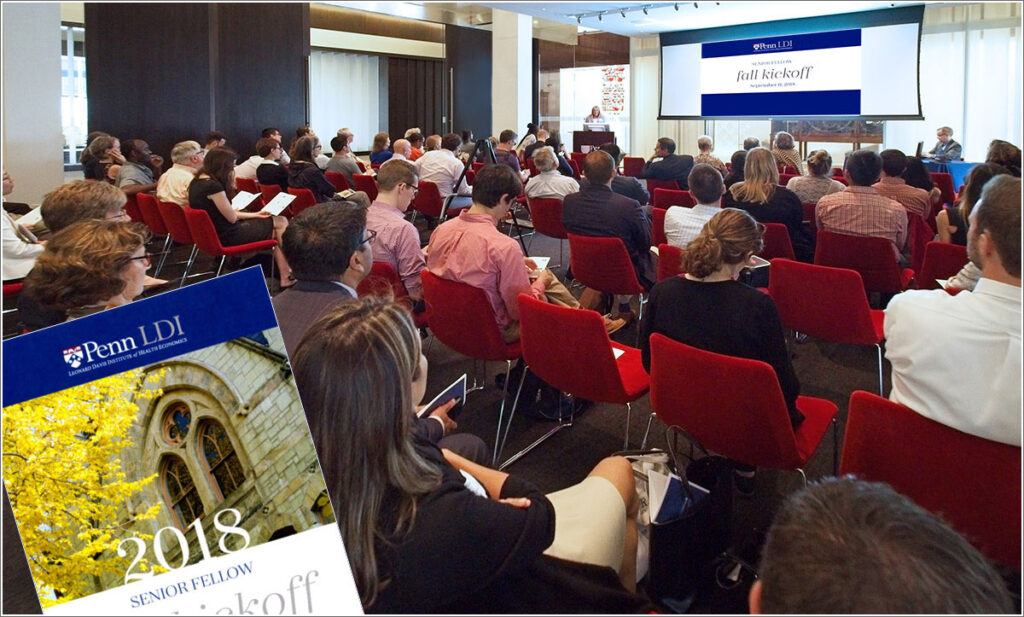
As part of its half-century tradition of fostering and supporting collaboration among its more than 400 Senior, Associate, and Adjunct Fellows, the Leonard Davis Institute of Health Economics held its sixth annual “Fall Kickoff” to welcome eighteen new Senior Fellows to its ranks. The newly inducted faculty members represent Penn’s Perelman School of Medicine, School of Nursing and School of Engineering as well as Children’s Hospital of Philadelphia and the Crescenz VA Medical Center. Each was allotted four minutes for a speed-dating-like presentation about themselves, their work and their collaborative interests. In his welcome, LDI Executive Director Daniel Polsky, PhD, emphasized that the gathering typified how LDI provides opportunities for health policy, health economics, and health services researchers to interconnect across the broad Penn community. A reception after the presentations enabled old and new Fellows to meet and chat about their mutual interests. These are the 18 new Senior Fellows who presented:
~ ~ ~
Stephanie Doupnik, MD, MSHP
Assistant Professor of Pediatrics, Perelman School of Medicine
Co-Medical Director, Inpatient Medical Behavioral Unit, Children’s Hospital of Philadelphia (CHOP)

Integrating Physical and Mental Health Care
A member of a team of pioneers engaged in the fully-integrated delivery of both physical and mental health care at Children’s Hospital of Philadelphia (CHOP), Doupnik is Co-Medical Director of the inpatient Medical Behavioral Unit (MBU). The three-year-old, ten-bed MBU is a unique collaboration between CHOP’s Departments of Pediatrics and Psychiatry that has achieved what many advocates have called for but few providers have attempted; the MBU was the first such unit established in the country. In 2018, Doupnik also received a 2018 NIMH grant to develop implementation strategies for suicide prevention and intervention for adolescents in medical hospital and emergency department care settings. The NIMH notes that currently, although 60,000 youths are annually hospitalized for suicide attempt injuries, there are generally no mental health follow-ups or supports after discharge. | See bio page |
Justin Clapp, PhD, MPH
Assistant Professor of Anesthesiology and Critical Care, Perelman School of Medicine
Assistant Professor of Anthropology

Anesthesiologic Anthropologist
A particularly interesting example of cross-discipline collaboration, Justin Clapp is believed to be the world’s only anthropologist with a primary appointment in a major health system’s Anesthesiology Department. He is Co-Director of the Penn Medicine Department of Anesthesiology and Critical Care’s Social Science Lab in Perioperative Medicine. That unit studies therapeutic decision making, clinician interaction and patient expectations across the full arc of care before, during and after surgery. Clapp said his career goal is to “inject rigorous social scientific theories, particularly those from sociology and anthropology, into this space of health services research.” He noted “the qualitative methods have been very well accepted but the theory is not really there yet.” | See bio page |
Nancy Hodgson, RN, PhD, FAAN
Associate Professor, Department of Biobehavioral Health
Term Chair, Gerontology, Penn School of Nursing

Evidence-Based Dementia Care Practices
Over the years, research has confirmed about 200 interventions that have a very strong effect in improving the quality of life of dementia patients and their caregivers but only 15 of those studies have been translated into practice, Hodgson told the LDI gathering. Chair of Gerontology at Penn’s Nursing School and a nationally recognized authority in the field, she noted that one of the most common complaints heard from caregivers is about their inability to access and understand evidence-based policies and practices related to their tasks. Hodgson’s next research project is focused on how best to develop and effectively disseminate best-practice information to the 50 million Americans engaged in caring for patients afflicted with various forms of dementia. | See bio page |
Alisa Stephens-Shields, PhD
Assistant Professor of Biostatistics, Department of Biostatistics, Epidemiology, and Informatics, Perelman School of Medicine

A Vending Machine Intervention
One of the projects Stephen-Shields is currently working on is a three-year longitudinal randomized trial of potential vending machine labeling interventions. Based on behavioral economics theory, the study’s goal is to identify ways to more effectively nudge purchasers into making healthier decisions about the products they select from the machine. The biostatistician is also interested in doubly robust methods, a class of problem modeling that allows a researcher to mis-specify a portion of his or her model but still recover unbiased and efficient estimates of the treatment effects his or her study is focused on. | See bio page |
Robert Burke, MD, MS, FHM
Director for Research, Hospital Medicine Section
Assistant Professor of Medicine, Perelman School of Medicine

Nursing Home Crisis
Burke’s research is driven by the reality that every day since January 1, 2010, ten thousand baby boomers have turned 65 and this will continue to happen through 2030. The hospitalist, who is a newcomer to Penn, noted the rate at which hospitals are discharging older adult patients directly to nursing homes has increased by 80% in recent years and that 6 out of 10 of those patients “have died, been readmitted to the hospital or are still in the nursing home a hundred days after discharge.” His work is focused on improving outcomes for older adults and identifying new ways to enable people to age independently at home, particularly after hospitalization. | See bio page |
Ariana Chao, PhD, RN, CRNP
Assistant Professor, Penn School of Nursing and Perelman School of Medicine

Binge Eating Disorder
Despite the fact that anorexia and bulimia tend to get all the press, binge eating is now the most common eating disorder in the U.S., according to the National Institute of Mental Health (NIMH). Chao’s research is focused on this malady that was only formally recognized in the Diagnostic and Statistical Manual of Mental Disorders (DSM) in 2013. Binge Eating Disorder (BED) is similar to bulimia but substantially different in that it does not involve forced purging as bulimia does. As a result, BED is a driver of obesity. Once diagnosed, it can be successfully treated with evidence-based Cognitive Behavioral Therapy (CBT) but Chao’s recent national survey found that less than 10% of primary care providers were able to identify the diagnostic criteria for BED. | See bio page |
Fred Henretig, MD
Professor Emeritus of Pediatrics, Perelman School of Medicine
Senior Toxicologist, Division of Emergency Medicine and Poison Control, CHOP

Oldest-Ever MSHP Student
A research topic Fred Henretig would like to explore is how best to motivate aging physicians who want to transition out of active clinical practice to a productive next stage of their career. And he has some particularly keen insights in this area. Retired after 40 years as a pediatric emergency medicine physician and toxicologist at Children’s Hospital of Philadelphia (CHOP), Henretig has become the oldest student ever admitted into Penn’s Masters of Science and Health Policy (MSHP) program. “I finally want to learn some good research skills and apply them to this and other questions that I find compelling, like childhood lead poisoning and other environmental issues,” said Henretig, who helped found the CHOP Poison Control Center in the 1980s and served as its Medical Director for two decades. | See bio page |
Jay Giri, MD, MPH
Interventional Cardiology and Director, Peripheral Intervention, Hospital of the University of Pennsylvania
Director, Cardiovascular Catheterization Laboratory, Crescenz VA Medical Center
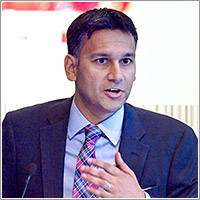
Gaming Cardiology Metrics
The fact that cardiologists may be the most measured of all medical specialty groups is both a blessing and a curse, according to Giri’s brief presentation. “What are the consequences of all this measurement,” he asked. “It’s widely accepted that there’s a lot of benefit but what happens nearly as much is the creation of a codified incentivization of changing physician behavior patterns, maybe sometimes adversely. Specifically, to cheat or lie on metrics, to game metrics and engage in practices that might have no benefits to patients — or even harm them — in order to perform better on metrics. And most insidious of all, to avoid risk and those patients who really need the help.” These issues are all targets of new research Giri will be conducting over the next three years. | See bio page |
Pamela Cacchione, PhD, CRNP, BC, FGSA, FAAN
Chair, Gerontological Nursing and Associate Professor of Geropsychiatric Nursing, Penn School of Nursing

Nursing Science ‘Pamdemonium’
Pam Cacchione’s nickname, “Pamdemonium,” is indicative of her surprisingly diverse set of research interests ranging from the management of long-term services for dual eligibles, to violence and aggression against health system workers, to the development of a digitally enabled sock that monitors a patient for the symptoms of heart failure. At Penn Presbyterian, Cacchione is also involved in the Acute Care for Elders (ACE) Unit that is the Philadelphia area’s first hospital unit staffed and equipped exclusively for geriatric care. Along with standard treatments, its team also focuses on things like preventing the functional losses often associated with elderly patients’ hospitalizations. Yet another of her projects seeks to perfect a low-cost mobile robot to support the home care needs of the elderly. | See bio page |
Konrad Kording, PhD
PIK University Professor, Department of Neuroscience, Perelman School of Medicine
andDepartment of Bioengineering in the School of Engineering and Applied Science

Unbelievably Big Data
Konrad Kording is a Penn Integrates Knowledge (PIK) University Professor with joint appointments in the Department of Neuroscience in the Perelman School of Medicine and the Department of Bioengineering in the School of Engineering and Applied Science. His work is focused on using data science to explore a range of topics that include brain function, personalized medicine, the diagnosis of various health conditions via mobile phone data analysis, and analyzing and predicting the behaviors and patterns of accomplishments of academic professionals. His team in the Kording Lab is currently conducting research in a number of areas including causality and machine learning, machine learning and deep learning for neuroscience, and machine learning for movement/meta-science. | See bio page |
Kalil Abdullah, MD
Instructor, Department of Neurosurgery, Perelman School of Medicine
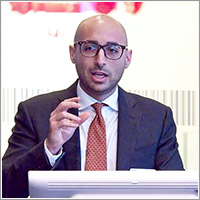
Brain Cancer Economics
Co-editor of the textbook “Glioblastoma” and a researcher focused on the economics of terminal brain cancer, Abdullah is also the co-founder and Director of the Penn Glioma Outcomes Project established two years ago. The goal, he explained, is to create a comprehensive clinical, economic and genomic outcomes database of glioma patients. Working with a team of 15 students and residents, the Glioma Outcomes Project has indexed the details of 800 Penn GBM patients “from the minute they walk through the door and were operated on until their death,” including the full genomic sequencing of 200 of their tumors. | See bio page |
Brian Jenssen, MD, MSHP
Faculty, PolicyLab at Children’s Hospital of Philadelphia (CHOP)
Instructor, Department of Pediatrics, University of Pennsylvania

Pediatric Programs for Adult Smokers
To the world outside the medical profession, the idea that a famed children’s hospital is a center of smoking cessation programs for adults may seem surprising. But CHOP pediatrician Brian Jenssen pointed out that adult smokers tend to be medically underserved and often don’t have their own providers. But they do go to their children’s doctors. “That’s why pediatricians are uniquely positioned to help parents quit smoking,” explained Jenssen whose research and work focuses on protecting children, parents and families from various kinds of tobacco smoke exposure. He is currently involved in a variety of clinical trials focused on identifying interventions using the idea of motivating parents to stop, not only for the sake of their own health but for that of their child’s as well. | See bio page |
Zarina Ali, MD, MS
Assistant Professor of Neurosurgery, Pennsylvania Hospital
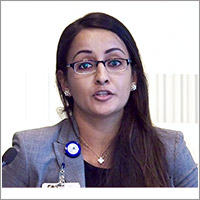
Revamping Spinal Surgery
Ali heads the year-old Penn effort to implement Enhanced Recovery After Surgery (ERAS) Protocols into its spine surgeries. ERAS is a concept that establishes a bundle of evidence-based procedures to be used throughout an entire episode of surgical care. It was developed in Europe 17 years ago and has since been implemented in some areas of U.S. surgery, but rarely in neurosurgery. “We dissected the entire surgical care pathway of a patient undergoing spine surgery from start to finish,” Ali explained. “We basically undid everything we were doing before in areas including pre-operative education, pain management and after-surgery communications and care.” She said result was “remarkable changes in our outcomes.” | See bio page |
Lilly Brown, PhD
Assistant Professor of Psychology, Department of Psychiatry
Center for the Treatment and Study of Anxiety

Foster Care Suicides
Brown’s research projects are focused on adolescents in the foster care system, HIV patients and active-duty members of the military at high risk of taking their own lives. She is studying the relationship between anxiety and trauma-related distress and suicide risk in an effort to learn more about potential interventions that could effectively reduce that risk. She’s also interested in big data and digital phenotyping, or the collection of a person’s digital footprint. “If I collect all the information possible about a person — cell phone usage, heart rate, physical activity levels, sleep data and responses to research questions I send them, how could I use that data to predict the transition from thinking about suicide to actually engaging in suicidal behavior,” she asked. | See bio page |
Hansel Otero, MD
Assistant Professor of Radiology, Perelman School of Medicine
Core Faculty, Center for Pediatric Clinical Effectiveness, Children’s Hospital of Philadelphia (CHOP)

Measuring the Value of Pediatric Imaging
Otero is a core faculty member of the Center for Pediatric Clinical Effectiveness (CPCE) at Children’s Hospital of Philadelphia (CHOP) and an Assistant Professor of Radiology at the Perelman School of Medicine at the University of Pennsylvania. He is a practicing pediatric diagnostic radiologist with research interests in the adoption of new technologies, variability and disparities in imaging services and radiology related outcomes in children. His presentation to the LDI audience was entitled “Value, Cost-effectiveness Analysis and Patients’ Preferences in Pediatric Imaging: The Evidence (or lack thereof) and a Way Forward.” His current research is focused on improving the system by which the value of pediatric imaging services can be monitored and measured. | See bio page |
Katharine Rendle, PhD, MSW, MPH
Assistant Professor of Family Medicine & Community Health, Perelman School of Medicine

Holistic Anthropologist Approach
Rendle, an interdisciplinary behavioral scientist trained in anthropology, epidemiology and social work, noted that anthropologists are differentiated by their holistic approach to studying humankind. “We might have one phenomenon we’re looking at but we still attend to how these larger social, cultural, linguistic and economic systems might impact that. This is why our work usually results in very, very thick books,” she said with a laugh. “My research is centered on the general question of how can we make health care delivery across the care continuum — from primary prevention all the way down to treatment — more effective, more equitable and more efficient,” she continued. Her recent research has focused on implementation science and shared decision making, clinical decision support, and the impact of guidelines on vaccine uptake and related decision making. | See bio page |
Louise Russell, PhD
Adjunct Professor, Medical Ethics and Health Policy, Perelman School of Medicine
Distinguished Professor Emerita, Rutgers University

Value of Patient Time and Energy
A member of the U.S. Public Health Service Panel on Cost-Effectiveness in Health and Medicine, Russell is a co-author of both the 1996 original and the 2016 second edition of the Oxford University Press landmark book Cost Effectiveness in Health and Medicine. “The purpose of cost-effective analysis is not, as sometimes thought, just to measure cost,” she said. “It’s to identify the interventions that bring the most health for the money. An area that I think could use more research attention is a crucial resource for the medical sector: patient time and emotional energy. The medical sector couldn’t function without it. Yet, very little attention is given to how much is being used and whether it’s being used effectively, for instance in patient self management programs.” | See bio page |
Marina Serper, MD, MS
Transplant Hepatologist and Assistant Professor of Medicine, Gastroenterology, Perelman School of Medicine
Staff Physician, Crescenz VA Medical Center
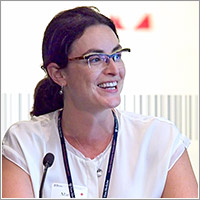
Measuring the Quality of Cirrhosis Care
“I’m broadly interested in how to improve health care quality and outcomes in chronic liver disease and after liver transplantation,” said Serper. “I’ve done interventions focused on how to reduce health care complexity through medication adherence after liver transplantation and some pilot projects in the Penn Institute for Translational Medicine and Therapeutics (ITMAT) applying behavioral economics strategies to physical activity, medication adherence and weight loss.” Serper is also funded to start projects focused on how to measure quality in cirrhosis care and best practices for implementing a hospital-based telemedicine service. | See bio page |







